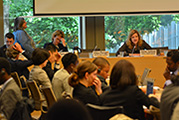The forum focused on rural poverty and gender inequality, employment and poverty alleviation, data gathering, and the Aid for Trade initiative.
“Lowering trade costs faced by developing countries and integrating them into the trading system is essential,” Anabel González of the World Bank Group said.
“But we have learned that this process of integration has the greatest impact on poverty reduction when poor people have been connected to the benefits of trade, with their capacities to gain maximized, and their vulnerabilities addressed,” she said.
The WTO's Trade Facilitation Agreement and Aid for Trade can help make it easier for small players in developing countries to participate in the international trading system, said Bridget Chilala, Director of the WTO's Institute for Training and Technical Cooperation. There remains room, however, to explore more ways to ensure trade eradicates poverty, she said.
Rural poverty
In the agriculture sector, several speakers called on policymakers to refrain from protectionist strategies as the trade distortions can hurt the rural poor, particularly in developing countries.
“One thing that is really important to keep in mind when considering the role of trade policy in agriculture is that most developing countries' agricultural trade is now with other developing countries,” said Will Martin, the President of the International Association of Agricultural Economists. “Very often, proposals for using protective barriers in developing countries will hit disproportionately imports from other developing countries.”
Price insulation, where the government pegs the domestic price for a crop at a fixed level, merely “exports” the price volatility problem to other countries, Mr Martin said. Stockholding food crops, likewise, is challenging in terms of stabilizing prices, he said. Policymakers should acknowledge that market integration through trade is the best way of managing price volatility as having access to multiple sources of supply reduces uncertainty. “This has important implications for trade negotiations at the WTO,” he said.
Ahmad Mukhtar from the United Nations Food and Agriculture Organization said that complex factors cause trade interventions to have varying effects on economies. He emphasized that the distribution of benefits from agricultural trade can be uneven.
For example, trade increases the variety of food available, thus contributing to food security. However, trade may also decrease the domestic availability of crops that are exported and this can mean increased prices for those commodities, Mr Mukhtar pointed out.
To manage this, governments can sometimes rely on protective barriers; however, he noted that there are also other tools such as using cash transfers and other social protection services for the poor as well as channelling investments to infrastructure to improve productivity.
Gender inequality
Participants touched upon gender inequality and how trade policy must be designed to address this issue. Mr Mukhtar noted that women make up 43% of the agriculture workforce in developing countries and that yields could grow by as much as 30% if women had equal access to resources.
Paul Brenton of the World Bank Group called on policymakers to consider “gender-sensitive” interventions for trade promotion and facilitation. He said that the WTO could include gender-specific analyses in its Trade Policy Reviews, for instance.
This is in recognition of the fact that “poverty disproportionately affects women and that trade is a key mechanism for women in their fight against poverty,” he said.
Employment
Other speakers shared their research on how trade affects employment. For Johannes Schwarzer of the Council on Economic Policies, the potential of trade to create jobs can be very significant. It has also been found that firms involved in international trade tend to be more productive, pay higher wages, and offer better labour conditions, he said.
However, trade also entails adjustment costs for workers who are displaced from their jobs.
“The size of the cost depends not only on trade policy and liberalization but also on workers' skillsets, access to credit and labour market regulations,” Mr Schwarzer said, adding that policymakers must not merely consider trade opening alone but how to be more active in shaping how the economy evolves.
Several participants in the WTO’s Chairs Programme for academic institutions shared case studies from Jordan, Tunisia and Benin to explore the link between trade, employment and household welfare. Other speakers demonstrated new approaches to gathering and using data to further refine trade policy design. Data, they said, is important to truly understand the needs of the poor and the impact of trade reforms.
Aid for Trade
A session on Aid for Trade emphasized the need for policies directed towards deepening the impact of trade on poverty.
“Liberalization alone is not enough,” said Fulbert Amoussouga-Gero from the University of Abomey-Calavi in Benin. “Aid for Trade has a leading role to play in poverty reduction.”
Such assistance helps to address the problems the poor face and to integrate markets into the global trading system, Ms González added.
Aid for Trade programmes must be tailored to the needs of each recipient country as the effectiveness of such efforts will depend on the structures of each market, said Paul Walters of the United Kingdom's Department for International Development.
“Trade is a major contributor in reducing poverty,” WTO Chief Economist Robert Koopman said at the end of the forum. “We need to consider how to re-energize trade as a tool for poverty reduction,” he said.
> Problems viewing this page?
Please contact [email protected] giving details of the operating system and web browser you are using.

